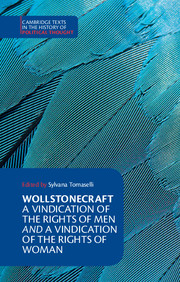Book contents
- Frontmatter
- Contents
- Preface
- Introduction
- Principal events in Wollstonecraft's life
- Bibliographical note
- Note on the edition
- A Vindication of the Rights of Men
- A Vindication of the Rights of Woman
- Dedication
- Advertisement
- Contents
- Introduction
- 1 The rights and involved duties of mankind considered
- 2 The prevailing opinion of a sexual character discussed
- 3 The same subject continued
- 4 Observations on the state of degradation to which woman is reduced by various causes
- 5 Animadversions on some of the writers who have rendered women objects of pity, bordering on contempt
- 6 The effect which an early association of ideas has upon the character
- 7 Modesty. – Comprehensively considered, and not as a sexual virtue
- 8 Morality undermined by sexual notions of the importance of a good reputation
- 9 Of the pernicious effects which arise from the unnatural distinctions established in society
- 10 Parental affection
- 11 Duty to parents
- 12 On national education
- 13 Some instances of the folly which the ignorance of women generates; with concluding reflections on the moral improvement that a revolution in female manners might naturally be expected to produce
- Hints, chiefly designed to have been incorporated in the second part of the Vindication of the Rights of Woman
- Biographical notes
- Index
- Cambridge Texts in the History of Political Thought
3 - The same subject continued
Published online by Cambridge University Press: 05 June 2012
- Frontmatter
- Contents
- Preface
- Introduction
- Principal events in Wollstonecraft's life
- Bibliographical note
- Note on the edition
- A Vindication of the Rights of Men
- A Vindication of the Rights of Woman
- Dedication
- Advertisement
- Contents
- Introduction
- 1 The rights and involved duties of mankind considered
- 2 The prevailing opinion of a sexual character discussed
- 3 The same subject continued
- 4 Observations on the state of degradation to which woman is reduced by various causes
- 5 Animadversions on some of the writers who have rendered women objects of pity, bordering on contempt
- 6 The effect which an early association of ideas has upon the character
- 7 Modesty. – Comprehensively considered, and not as a sexual virtue
- 8 Morality undermined by sexual notions of the importance of a good reputation
- 9 Of the pernicious effects which arise from the unnatural distinctions established in society
- 10 Parental affection
- 11 Duty to parents
- 12 On national education
- 13 Some instances of the folly which the ignorance of women generates; with concluding reflections on the moral improvement that a revolution in female manners might naturally be expected to produce
- Hints, chiefly designed to have been incorporated in the second part of the Vindication of the Rights of Woman
- Biographical notes
- Index
- Cambridge Texts in the History of Political Thought
Summary
Bodily strength from being the distinction of heroes is now sunk into such unmerited contempt that men, as well as women, seem to think it unnecessary: the latter, as it takes from their feminine graces, and from that lovely weakness the source of their undue power; and the former, because it appears inimical to the character of a gentleman.
That they have both by departing from one extreme run into another, may easily be proved; but first it may be proper to observe, that a vulgar error has obtained a degree of credit, which has given force to a false conclusion, in which an effect has been mistaken for a cause.
People of genius have, very frequently, impaired their constitutions by study or careless inattention to their health, and the violence of their passions bearing a proportion to the vigour of their intellects, the sword's destroying the scabbard has become almost proverbial, and superficial observers have inferred from thence, that men of genius have commonly weak, or, to use a more fashionable phrase, delicate constitutions. Yet the contrary, I believe, will appear to be the fact; for, on diligent inquiry, I find that strength of mind has, in most cases, been accompanied by superior strength of body, – natural soundness of constitution, – not that robust tone of nerves and vigour of muscles, which arise from bodily labour, when the mind is quiescent, or only directs the hands.
- Type
- Chapter
- Information
- Wollstonecraft: A Vindication of the Rights of Men and a Vindication of the Rights of Woman and Hints , pp. 109 - 125Publisher: Cambridge University PressPrint publication year: 1995



